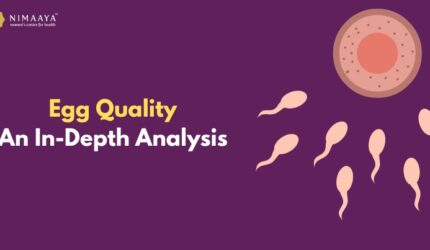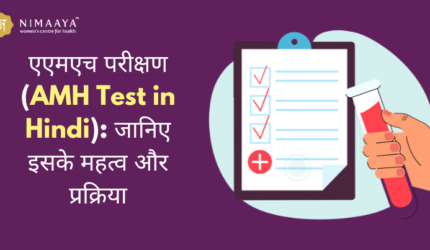Nowadays, infertility has emerged as a major problem among couples, with fertility testing often being the only solution.
Approximately 7 out of 10 Indian couples face infertility problems. To successfully achieve a pregnancy, couples undergo fertility testing to explore assisted reproductive technology (ART) that is most suitable for them and has minimum risk involved.
In this blog, we will delve into the fundamentals of fertility testing, exploring its types, purpose, and associated benefits.
This will aim to guide you through a comprehensive fertility assessment, facilitating your journey towards achieving a successful pregnancy.
Let’s get started!
What is Fertility Testing?
The first stage of infertility treatment is used to assess the problem of not allowing couples to conceive a baby. The testing involves both men and women and begins by exploring the couple’s medical history and lifestyle, followed by other important tests.
Coping with fertility testing can be a daunting task for individuals, irrespective of gender. The IVF center holds a consulting session to assist in this process before commencing fertility treatments.
Female Fertility Testing
Female fertility testing encompasses a range of assessments to evaluate reproductive and health factors affecting fertility. It aims to provide insights into ovulatory function, hormonal balance, and overall reproductive health, guiding appropriate treatment or interventions.
Also Read: Female Infertility: Causes, Diagnosis, and Treatment Options
Male Fertility Testing
Male Fertility test focuses on two factors: sperm health and production. Blood tests are conducted to assess hormone levels, particularly to evaluate hormone levels, such as FSH and LH, providing insights into male reproductive health. Additionally, specialized tests such as genetic screening or ultrasounds may be employed to identify the underlying condition affecting fertility.
Also Read: Male Infertility: Causes, Diagnosis, and Treatment Options
Types of Fertility Testing
The fertility testing process involves guiding both women and men through various tests to identify potential issues affecting them to conceive a baby. Let’s explore different types of testing:
1) Blood Test
Blood tests evaluate hormone levels in the body, including FSH, LH, estrogen, progesterone, and testosterone. These tests screen for diseases impacting fertility, evaluate ovarian function, detect menstrual cycle irregularities, and identify hormone imbalances.
2) Ovulation Monitoring
This monitoring or testing involves tracking a woman’s menstrual cycle to identify the most fertile period for potential conception. Understanding and predicting ovulation are crucial for couples attempting to conceive.
3) Hysterosalpingography (HSG)
Hysterosalpingography utilizes X-ray contrast injected into the uterus to examine the potential issues within. This test assesses whether fluid passes out of the uterus and fallopian tubes, leading to further evaluations if problems are detected.
In case there is any problem found, then there will be further evaluation and tests need to be conducted.
4) Semen Analysis
A Semen Analysis test is conducted to check sperm quality, including sperm count, motility, morphology, and other parameters. This helps us in determining male fertility and potential health issues related to sperm health.
5) Pelvic Ultrasound Examination
It uses ultrasound sound waves to generate images of the uterus and ovaries. This test will show the doctor how follicles within the ovary are functioning. It is usually performed approximately two weeks before a woman’s menstrual period.
Also Read: Understanding Pelvic Inflammatory Disease: Causes, Symptoms, and Treatment
6) Hormone Test
It involves assessing various hormones like FSH, LH, thyroid hormones, and others, offering insights into ovulation, menstrual cycle irregularities, and hormonal imbalances affecting fertility.
7) Ultrasound
It examines the uterus, ovaries, and fallopian tubes, providing detailed information about their size, structure, and potential abnormalities impacting fertility. Additionally, the ultrasound
gives an idea of how follicles within the ovary are functioning.
Purpose of Fertility Testing
One of the reasons why couples and individuals often opt for fertility testing is to avoid the hardships associated with conceiving a baby, among other reasons. Let’s explore the purpose of fertility testing one by one in detail:
Ⓐ Assessing Reproductive Health
Fertility testing evaluates the reproductive health of both partners, identifying any underlying issues that might hinder pregnancy.
Ⓑ Identifying Potential Fertility Issues
There may be a few reasons why couples face fertility issues. A few of the reasons could be hormonal imbalance, ovulatory disorder, structural issues, or sperm abnormalities that will allow for timely intervention or treatment.
Ⓒ Understanding Fertility Status
In-depth assessment provides insights into fertility status, including sperm count and quality for males, ovarian reserve, hormone level, and menstrual cycle evaluation for females.
Ⓓ Planning for ART
Fertility testing guides decisions about utilizing assisted reproductive technology (ART) such as IVF, IUI, ICSI, and many more for couples experiencing difficulty conceiving.
Ⓔ Family Planning
Fertility testing isn’t solely for couples facing any fertility issues; it’s also for individuals seeking to understand their fertility status for future family planning purposes.
Benefits of Fertility Testing
To know the appropriate treatment to get pregnant faster, consulting an IVF specialist and undergoing fertility testing is crucial. Let’s explore the benefits of fertility testing:
① Early Detection of Issues
Fertility testing facilitates the early identification of issues, enabling timely intervention and treatment.
② Improving Success Rates
Early detection of infertility issues will help couples optimize their chances of conception by detecting the issue and following the appropriate treatment that can be followed to improve the successful chances of conceiving a baby.
③ Reducing Stress and Uncertainty
The major benefit of fertility testing is that it reduces stress among couples who are struggling to conceive a baby. This is beneficial because they will know after consultation what are the actual chances and identify beneficial treatment options, reducing uncertainty.
④ Assessment of fertility health
Fertility testing involves evaluating hormonal levels, ovarian reserve, sperm quality, and underlying conditions affecting fertility. This early assessment aids couples in accessing appropriate treatments such as IVF, ICSI, IUI, or any other treatment beneficial for them.
⑤ Planning for ART
Fertility testing offers crucial information regarding ART treatments like ICSI, IUI, or IVF, assisting in determining the most effective and suitable ART options for couples.
Consideration for Individuals and Couples Seeking Assistance for Fertility Potential
Consideration for individuals and couples seeking assistance for fertility potential
Certain conditions are to be taken into consideration for both couples and individuals seeking assistance for fertility testing. They are:
Physical Factors
Major causes of infertility in women are:
- Tumor or cancer
- Diabetes
- Autoimmune disorders
- Thyroid diseases
- Obstruct fallopian tubes either blocked or swollen
Major Causes of Infertility in Men are:
- Functional problem with ejaculation
- A genetic disorder resulting in low sperm or no sperm production
- Hormone disorders such as increased exposure to estrogen
Lifestyle factors
There are lifestyle factors in women and men that could affect fertility. It includes:
- Emotional stress
- More amount of physical activity
- Increased emotional stress
- Smoking, drinking, or drug addicted
Bottom Line
To sum up, we learned about fertility testing and other crucial tests such as genetic testing and anti-mullerian hormone (AMH testing) evaluations, which are essential and ultimately help you in preparing for conceiving a baby.
Nimaaya IVF fertility center has been helping couples and individuals conduct tests for over a decade, providing consultations and identifying solutions. We have an up-to-date laboratory with the latest equipment to conduct tests. Moreover, our team of skilled professionals ensures that confidentiality is maintained regarding our clients’ information with us.







Comments 2
Nicce post. I was checking continuously this blog and I’m
inspired! Extremely useful information particularly the closing
phase :)I maintain such info much. I userd to be looking for this certain information for a
long time. Thanks and best oof luck.
I think this blog really helps understand fertility issues better. It talks about tests and treatments in a way that’s easy to understand. The early detection and planning for treatments provides hope and guidance for those on the journey to parenthood. To know more about infertility test for women visit my website.